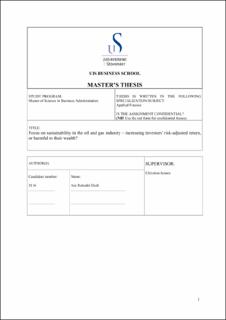| dc.contributor.advisor | Jensen, Christian | |
| dc.contributor.author | Ekeli, Are Rettedal | |
| dc.date.accessioned | 2020-09-21T13:54:00Z | |
| dc.date.available | 2020-09-21T13:54:00Z | |
| dc.date.issued | 2020-06 | |
| dc.identifier.uri | https://hdl.handle.net/11250/2678872 | |
| dc.description | Master's thesis in Applied Finance | en_US |
| dc.description.abstract | Expectations of increased global energy demand in the years to come, together with a desperate need to decrease global emissions, have contributed to increased investor attention to the environment and sustainability. This research explores the implications of this focus on investors' risk-adjusted return.
The strong link between negative environmental externalities and the products the oil & gas industry produce and sell make this industry particularly relevant. Clear differences among the firms in the industry concerning their role and responsibility towards the reduction of emission make the industry even more interesting. Therefore, this research seeks to answer the following research question:
Focus on sustainability in the oil and gas industry – increasing investors' risk-adjusted return, or harmful to their wealth?
Sustainability performance is measured through ESG-scores, provided by MSCI. Using panel data models, this research fails to find any significant relationship between ESG performance and stock return. In addition, the effect of changed ESG-score, called momentum, was tested on both stock return and stock volatility, but the results were inconclusive.
However, this research finds that firms with good ESG performance have significantly lower monthly stock volatility than firms with poor ESG performance. The reduction is slightly above one-fifth of the poor performers' volatility. Several possible explanations are presented, including a lower likelihood for firms with good ESG performance to experience scandals and receive negative press publicity. Another explanation is that the good ESG performers are more likely to invest in renewable energy, which reduces their exposure to oil & gas prices. Hence, more diversified sources of revenues could explain the lower stock volatility for these firms.
Investors who seek wealth maximization through the highest possible risk-adjusted return is, based on these results, recommended to invest in oil and gas companies with good ESG performance. | en_US |
| dc.language.iso | eng | en_US |
| dc.publisher | University of Stavanger, Norway | en_US |
| dc.relation.ispartofseries | Masteroppgave/UIS-HH/2020; | |
| dc.rights | Navngivelse 4.0 Internasjonal | * |
| dc.rights.uri | http://creativecommons.org/licenses/by/4.0/deed.no | * |
| dc.subject | anvendt finans | en_US |
| dc.subject | økonomi | en_US |
| dc.subject | administrasjon | en_US |
| dc.subject | Sustainability | en_US |
| dc.title | Focus on sustainability in the oil and gas industry – increasing investors' risk-adjusted return, or harmful to their wealth? | en_US |
| dc.type | Master thesis | en_US |
| dc.subject.nsi | VDP::Social science: 200::Economics: 210::Business: 213 | en_US |

